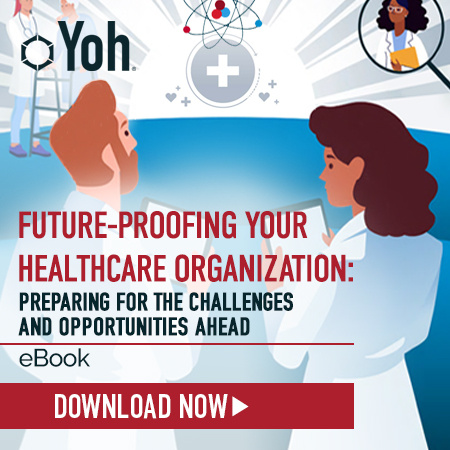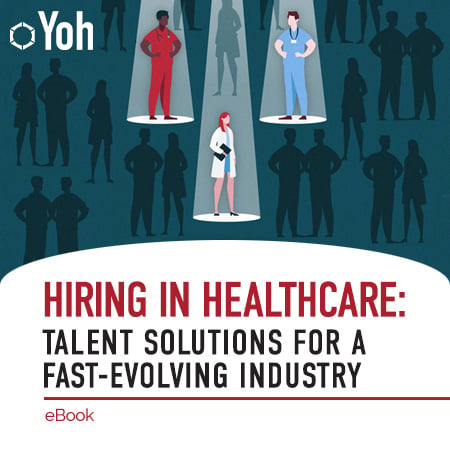Healthcare
The cure to what ails your healthcare recruiting needs.
Allied Health
Connecting you with expert technicians and therapists to enhance patient care and operations. From diagnostics to therapy, we've got your team covered.
Learn More
Clinic-Based Care
Our tailored talent solutions ensure seamless outpatient care, allowing clinics to operate smoothly and provide high-quality service to patients.
Learn More
Behavioral and Mental Health
Recognizing the importance of mental health support, our talent network includes experts in nurturing healthy minds and bodies.
Learn More
Managed Care and Case Management
Whether you're prioritizing cost reduction and quality improvement or need assistance with assessment, coordination, and advocacy, we're here to help.
Learn More
HIM and RCM
A healthy revenue cycle is critical today. Boost your cash flow, accurately code services rendered, and reduce your AR days with Yoh's subject matter experts.
Learn More
Occupational and Employee Health
Customized health and wellness programs from Yoh keep your employees healthy and informed, ensuring a productive workforce.
Learn More
Driving healthcare Excellence
LIFE-SAVING TALENT - SKILLFULLY DELIVERED!
Yoh Healthcare provides strategic resourcing and staffing solutions to the healthcare sector. Supporting a wide range of settings including manufacturing facilities, corporate offices, hospitals, clinics, health plans, and MCOs, Yoh acts as an extension of your organization to provide a suite of flexible and scalable services. Whether you need one person or a complete functional team of subject-matter experts (SMEs), we deliver the talent you need, when you need it.
WHY YOH HEALTHCARE?
DEEP SUBJECT-MATTER EXPERTISE
Yoh’s teams of Healthcare experts are deeply rooted in the sector and known for both their market knowledge and the caliber of their networks. They’re equipped to shape your talent strategies and delivery within the rapidly evolving Healthcare landscape.
A CUSTOMIZED APPROACH
Because every client is unique, we take a personalized and consultative approach to each one. Yoh invests ample time in understanding your pain points, hiring expectations, technical requirements, and company culture to present a fully customized solution that suits you best.
Recruiting solutions that flex with your business.
Need to scale fast with the right talent? Yoh connects you to specialized professionals who hit the ground running, whether you need short-term support, permanent hires, or full project teams.
Explore Recruiting Services >
/Specialty%20Practices%20Stock/hc%20worker.jpg)



